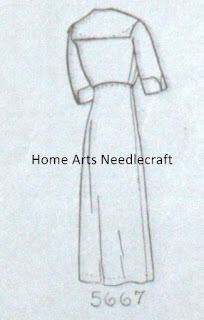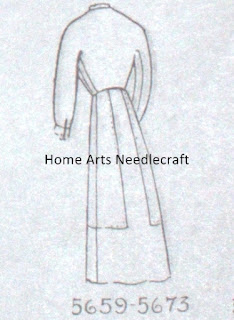January, 1912
page 2
Ladies’ Dress
For general wear, a
one-piece serge dress will give elegant service. For wear under the long coats now so
prominently fashionable, a dress of this type fulfills many purposes.In the pretty model presented in No. 5667, we have a dress that for utility wear cannot be equaled. It is so smart and jaunty that it is easy to see why such a type has achieved popularity. This is an up-to-date adaptation of that popular “Peter Pan” model. The sleeves are in the favorite kimono-style, are three –quarter length, and are finished with a turnback cuff. The collar may be round or square.
The skirt is a slender, three-piece one, perfectly plain, yet with convenient swing at bottom. The dress hooks down the front. Navy-blue or black serge should be used, with collar and cuffs of striped goods. Wool mixtures is an appropriate suggestion, and would be warm and comfortable at the present time.
The pattern, No. 5667, is cut in sizes from 32 to 42 inches bust measure. To make the dress in the medium size will require 4 ½ yards of 44-inch material, with 7/8 of a yard of contrasting goods for collar and cuffs. Price of pattern, 10 cents.
Ladies’ One-Piece Dress
This effective one-piece
dress, No. 5446, is developed along simple lines. To the woman who makes her own clothes it
will especially appeal, as, added to its attractive appearance, its
construction is within the limits of home possibilities. The waist has the popular Gibson plaits over the
shoulders at front and back. At the
front the plaits are only partly stitched, giving becoming fullness to the
blouse. AT the back the stitching
extends to the waistline.The three-quarter sleeves are set in without gathers, and are finished with bell-shaped cuffs. The round, collarless neck has a band of insertion, which extends across the waist to the shoulders.
The skirt is cut in five gores, the front gore having a panel-effect. At the back there is an inserted plait.
The pattern provides a guimpe with high neck and long sleeves, so costume can be worn at once for street under long coats, or can be used later with short sleeves and collarless.
This is a pretty, yet sensible little dress, which is good-looking and stylish. It is a splendid model for serge, Henrietta, cashmere or pongee, according to the purpose for which the dress is intended. For the frock of wash-material which are worn now at all seasons, it is also appropriate.
The pattern, No. 5446, is cut in sizes from 32 to 42 inches bust measure. The width of lower edge is 3 yards. To make the dress in the medium size will require 5 ¼ yards of 36-inch material for dress, 2 5/8 yards of 18-inch goods for guimpe, and 3 1/8 yards of band trimming. Price of pattern, 10 cents.
Ladies’ Waist
Women who are looking for
a waist that will be equally adapted for separate wear with a tailored suite or
for the development of a semiprincesse dress will find model No. 5678
fulfilling all requirements.The fashioning of the garment is simplicity itself. The front and back of the waist are tucked, the back tucks running to the waistline, while the front ones make for fullness in the blouse by being released at about bust-depth.
Plain sleeves end with a loose cuff. The features of this garment are at once evident. Two of the latest-style effects are exemplified, the handsome Diretoire revers which extends to the belt, and the plaited peplum at bottom.
These give a distinctive appearance to the waist, and will make it a favorite one with women of refined taste and discernment.
Cotton voile is a favorite material this season, and is well suited for a garment of this character. Linen, madras, or lawn may be used if the waist is for separate wear. If used as part of a complete costume Pongee, serge, or satin may be used.
The pattern, No. 5678, is cut in sizes from 32 to 42 inches bust measure. To make the waist in the medium size will require 2 ½ yards of 36-inc material. Price of pattern, 10 cents.
Ladies’ Shirtwaist Costume
A costume always
appropriate for general wear, and one
that should constitute a part of every well planned wardrobe is the popular
shirtwaist suit, an excellent model for which is given in No. 5659 and No.
5673.This dress is one that is easily slipped on, and yet presents a clever, stylish appearance. Beside embodying these appealing features, the garment pictured is well within the range of the most inexperienced needleworker.
The plain, mannish, shirt-style waist has body and upper part of sleeves in one. It is made with no seam at back or front, the waist being joined by the underarm gores. The garment closes through a center box plait. The long, plain sleeves are finished with a mannish cuff. Waist is finished with a neckband which admits of any style collar being worn.
The skirt of this costume is a distinct novelty. It is a six-gored model, with overskirt-effect. Garment has the regulation waistline, but pattern is perforated for Empire style, and for wear with dressy waist this style might be employed. The skirt closes at the left side of the back.
Serge or mohair would make up this costume nicely, but any of the popular wash-fabrics might be used.
The waist-pattern, No. 5659, is cut in sizes from 32 to 44 inches bust measure. To make the waist in the medium size will require 2 yards of 36-inch material, or 3 3/8 yards of 27-inch goods. Price of pattern, 10 cents.
The skirt-pattern, No. 5673, is cut in sizes from 22 to 30 inches waist measure. To make the garment in the medium size will require 4 ¼ yards of 36-inch material. Price of pattern, 10 cents.
No more graceful model
for a simple, inexpensive gown could be employed than the one given in design
No. 5437 and No. 4849. This is an
effective combination of two patterns, which result in a dainty, stylish
toilette, nice enough for the most informal wear.
The waist is in peasant blouse-effect,
with the yoke extending to the lower part of the sleeves. It is prettily tucked, front and back, the
front tucks being released at bust-depth to provide necessary fullness. The short kimono sleeves are tucked
across. The collarless neck is round,
the lace yoke being finished with narrow Val. Edging
The seven-gored, plaited
skirt completes this chic costume. The
plaits are stitched to hip-length, where they are released, giving graceful fullness
that still adheres to the straight lines demanded by the mandates of
fashion. Either Empire or regulations
waistline may be used.
This dress may be
developed in plain lawn, think silk, cashmere, mohair or pongee.
The waist-pattern, No.
5437, is cut in sizes from 32 to 42 inches bust measure. To make the waist in the medium size will
require 2 1/8 yards of 36-inch material, and ¾ of a yard of 18-inch allover. Price of pattern, 10 cents.
The skirt-pattern, No
4849, is cut in sizes from 22 to 32 inches waist measure. To make the skirt in the medium size will
require 6 yards of 36-inch material.
Price of pattern, 10 cents.






No comments:
Post a Comment